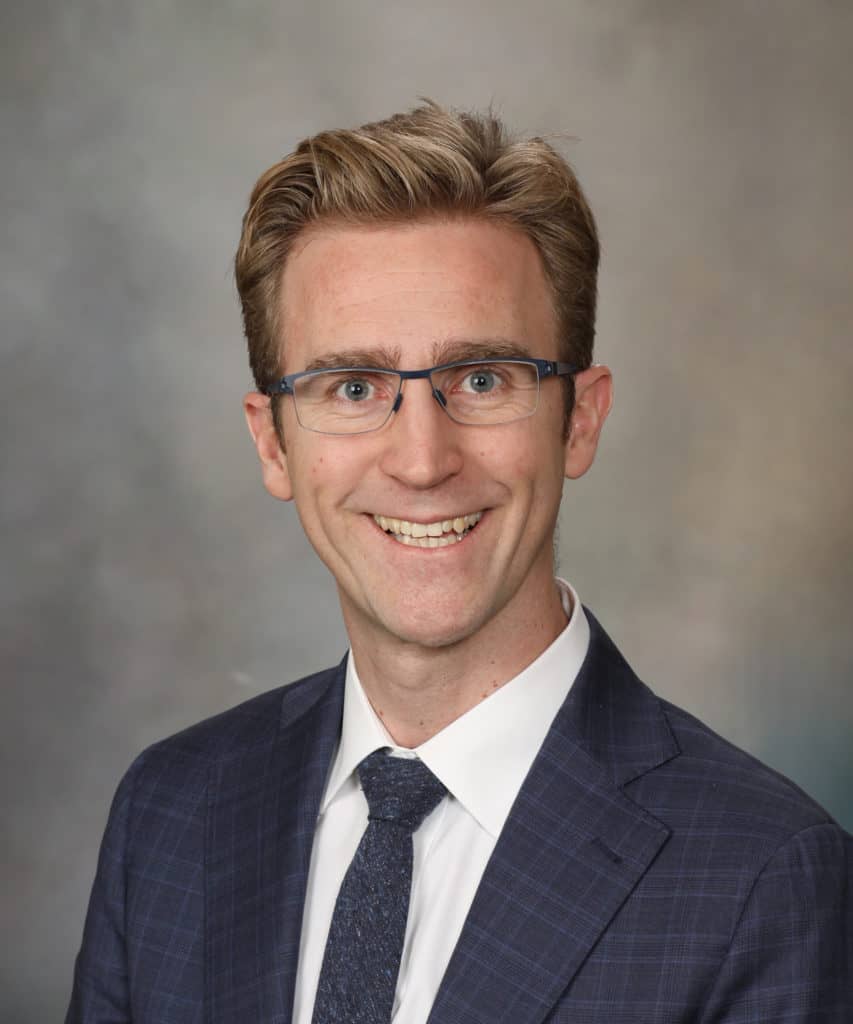Dr. Mansfield Explains the Importance of Clinical Trials for Mesothelioma Research

Dr. Aaron Mansfield, a translational scientist at the Mayo Clinic and Associate Professor of Medical  Oncology, first became interested in studying immunology before he even began medical school. “While I was in college, I took courses in immunology and became fascinated with how the immune system works, and how many immunologic tools have advanced other scientific disciplines,” Dr. Mansfield recently told the Mesothelioma + Asbestos Awareness Center. “My interest in immunology has been sustained since I started at Mayo Clinic and had the tremendous good fortune to work with pioneers in tumor immunology, including Svetomir Markovic and Haidong Dong.”
Oncology, first became interested in studying immunology before he even began medical school. “While I was in college, I took courses in immunology and became fascinated with how the immune system works, and how many immunologic tools have advanced other scientific disciplines,” Dr. Mansfield recently told the Mesothelioma + Asbestos Awareness Center. “My interest in immunology has been sustained since I started at Mayo Clinic and had the tremendous good fortune to work with pioneers in tumor immunology, including Svetomir Markovic and Haidong Dong.”
Since he first took interest in the immune system, Dr. Mansfield has worked on various early-phase clinical trials for treating mesothelioma, lung cancer and other thoracic malignancies. His day-to-day varies from working in the clinic and treating patients to focusing on research. He also works with Mayo Clinic’s Early Cancer Therapeutics Program, which runs clinical trials with novel agents.
Mesothelioma has had the same standard of care for many years, focusing on traditional treatments like surgery, chemotherapy and radiation. Within the past decade, emerging treatments like immunotherapy have started to become more prominent in clinical trials for mesothelioma and other cancers, and show great potential for being an effective treatment for long-term survival.
Challenges of Treating Mesothelioma
This rare, aggressive cancer has been well known for its difficulty to treat and the lack of long-term survivors of the disease. Most patients are given a life expectancy of about a year, or possibly 21 months if they’re lucky. Research for better diagnostic techniques and more effective treatments are crucial for improving this poor prognosis, but even with some of the advancements being made, researchers and patients still face several challenges in treating the disease.
Limited Treatment Centers
Because mesothelioma is so rare, many cancer centers and hospitals don’t have a lot of experience in treating the disease. A lot of patients have to travel, sometimes even out of state, to find a treatment center that specializes in care for mesothelioma like the Mayo Clinic.
Dr. Mansfield sees better awareness and knowledge of the disease in the public, though it hasn’t really led to more centers equipped to treat the disease. “I think that the frequent advertising regarding mesothelioma has brought significant awareness to this disease; however, there are only a select number of centers that specialize in treating patients with it,” he told the MAA Center.
“Patients have found significant amount of support through organizations like the Mesothelioma Applied Research Foundation, which has helped connect patients with expert centers and disseminate critical information about novel discoveries and clinical trials,” Dr. Mansfield continued.
With the right resources, hopefully more patients will be connected with emerging treatment options early on, rather than as a last resort. However, many will still likely have to travel for these opportunities.
Availability of Clinical Trials
While there are always new clinical trials beginning to recruit patients, as well as active studies going on, it can be difficult for patients to find studies they’re eligible for. Even when they fit the eligibility criteria, depending on the phase of the trial, only a small number of patients may be selected. For other patients, it may be difficult to choose one clinical trial over another when deciding between several promising treatments.
“Many clinical trials though are currently testing drugs in the front-line setting in comparison to our standard chemotherapy,” Dr. Mansfield explained. “This means that patients may only have a single chance of accessing these drugs, and participation in one frontline trial will limit the accrual to another. In other words, given the relative rarity of mesothelioma I think that there will be significant competition for patients for some of these frontline clinical trials.”
Funding for Mesothelioma Research
Many champions for rare diseases often feel overlooked compared to more common conditions in terms of research and donations. Developing and testing new treatments, regardless of the type of cancer or disease they are for, is a growing expense around the world and can hold back research.
“I am sure that specialists in any disease group will say that there is never enough funding to do all the research they would like,” Dr. Mansfield reasoned. “Fortunately, mesothelioma is not as common as other cancers, but its prevalence may lower its significance in funding priorities.”
There are, however, research grants available, and with the promised $1 billion to fund former Vice President Joe Biden’s Cancer Moonshot initiative research, there will hopefully be even more opportunities for treatment research for all kinds of cancer. Dr. Mansfield added, “I have been encouraged by opportunities available through the Mesothelioma Applied Research Foundation, the Department of Defense and the National Cancer Institute.”
Progress Through Clinical Trials
Within the last decade, researchers have made some promising advances in new diagnostic tests for mesotheliomas, like biomarkers, and emerging treatment options like immunotherapy. More and more, researchers are studying new potential drugs and treatment combinations to find the most effective treatment.
“The FDA approval of a platinum-based regimen for mesothelioma has been our standard of care for many years now,” Dr. Mansfield told the MAA Center. “Since then, there has been significant growth in the number of new agents being tested for the treatment of mesothelioma, and there has been sustained effort at many academic centers to continue to develop these therapies and other approaches for our patients.”
At the forefront of these developments are clinical trials. Dr. Mansfield explained, “Clinical trials are absolutely critical to the development of more effective treatments. Despite the promise of the novel approaches, many of these fail. Without carefully studying a novel approach in relation to the standard, there is no way to know that it is better or for it to be widely accepted.”
Immunotherapy, for instance, is currently only available for mesothelioma patients through clinical trials. So far, drugs like pembrolizumab or nivolumab have shown great potential as an effective treatment for the disease, but are still in the process of being thoroughly tested in these studies to determine if it’s as or more effective than the current standard of treatment. Immunotherapy is currently in mesothelioma trials as an individual treatment, as well as in combination with other therapies.
“I think the potential to harness the immune system to treat mesothelioma through PD-1 or PD-L1 inhibition, or other means, is the most exciting development for mesothelioma,” Dr. Mansfield said.”
Pembrolizumab and nivolumab are one type of such promising immunotherapy drugs that work as inhibitors to the pathway of these proteins Dr. Mansfield describes, which disrupts the growth and spread of cancer cells. PD-1 and PD-L1 inhibitors so far been approved to treat a number of cancers, including melanoma and non-small cell lung cancer. Researchers hope with further study and evidence of its efficacy, it can also be approved for mesothelioma in the near future.
Until then, researchers like Dr. Mansfield hope to continue breaking ground with the disease and get closer to finding a cure. “My overall goal is to continue to work on discovering novel ways of treating mesothelioma and other thoracic malignancies to improve the lives of our patients with these diseases.”